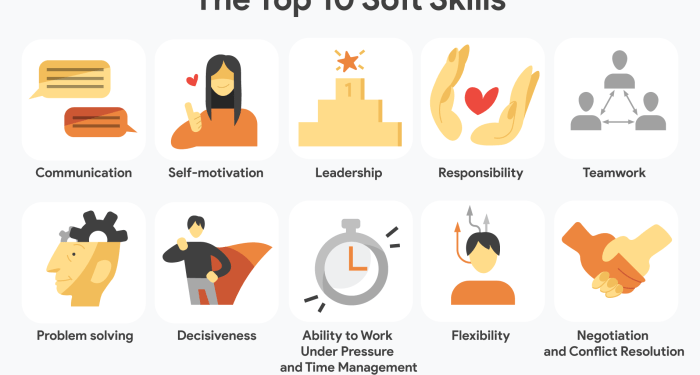Exploring the realm of Soft skills for IT career success, this introduction sets the stage for a deep dive into the importance of soft skills in the ever-evolving IT industry. From enhancing teamwork to boosting productivity, the role of soft skills is indispensable for professionals aiming to thrive in their IT careers.
Importance of Soft Skills in IT
Soft skills play a crucial role in the success of individuals pursuing a career in the IT industry. While technical skills are essential for performing specific tasks, soft skills are equally important for overall professional growth and success in the field.In the IT industry, soft skills such as communication, teamwork, problem-solving, and adaptability can complement technical skills effectively.
For example, a software developer with excellent coding skills may not succeed in delivering a project if they lack the ability to communicate effectively with team members or clients. Soft skills enhance collaboration, creativity, and productivity in IT teams, leading to successful project outcomes.
Effective Communication within IT Teams
Effective communication is a key soft skill that contributes significantly to the success of IT teams. Clear and concise communication helps team members understand project requirements, share ideas, and resolve issues efficiently. When team members can communicate effectively, they can work together seamlessly to achieve project goals and deliver high-quality results.
- Active listening is essential in ensuring that all team members understand project requirements and expectations.
- Clear and concise communication helps in avoiding misunderstandings and delays in project delivery.
- Providing constructive feedback promotes continuous improvement and fosters a positive team environment.
- Effective communication skills enable IT professionals to present their ideas persuasively and influence key stakeholders.
Essential Soft Skills for IT Professionals

In addition to problem-solving skills, there are several other soft skills that are essential for IT professionals to succeed in their careers.
Significance of Problem-Solving Skills
Problem-solving skills are crucial in the IT field as professionals often encounter complex technical issues that require innovative solutions. The ability to analyze problems, think critically, and devise effective strategies to resolve issues is highly valued in the IT industry.
Problem-solving skills also involve the capacity to troubleshoot efficiently, identify root causes of issues, and implement timely and practical solutions to ensure smooth operations.
Role of Adaptability and Flexibility
Adaptability and flexibility are key soft skills that IT professionals must possess due to the constantly evolving nature of technology. In the fast-paced IT industry, professionals need to adapt to new technologies, methodologies, and work environments quickly. Being flexible allows IT professionals to adjust to changing priorities, project requirements, and team dynamics effectively.
The ability to embrace change and demonstrate resilience in the face of challenges is essential for success in an IT career.
Communication Skills in IT

Effective communication skills are crucial for IT professionals as they play a vital role in conveying complex technical information in a clear and concise manner. Communication is the key to successful collaboration, problem-solving, and project delivery in the IT industry.
Enhancing Teamwork in IT Projects
Good communication enhances teamwork in IT projects by ensuring that all team members are on the same page regarding project goals, timelines, and tasks. Clear communication helps in avoiding misunderstandings and conflicts, leading to improved productivity and project outcomes.
- Regular team meetings where progress updates and challenges are discussed can help in fostering better communication among team members.
- Utilizing collaboration tools like Slack, Microsoft Teams, or Jira can facilitate real-time communication and information sharing within the team.
- Encouraging an open and transparent communication culture where team members feel comfortable sharing their ideas and concerns can lead to more innovative solutions and efficient problem-solving.
Impact on Client Interactions and Project Management
Communication skills also play a crucial role in client interactions and project management in the IT industry. Building strong relationships with clients and stakeholders requires effective communication to understand their requirements and expectations accurately.
- Active listening skills help IT professionals to grasp client needs and provide tailored solutions that meet their expectations.
- Clear and concise communication with clients regarding project milestones, deliverables, and any potential challenges can help in managing client expectations and building trust.
- Effective communication within project teams and with clients can result in smoother project execution, timely delivery, and overall client satisfaction.
Leadership and Collaboration in IT

In the fast-paced world of IT, leadership and collaboration are crucial elements for successful project management and team productivity.
Role of Leadership Skills in IT Project Management
Effective leadership skills play a vital role in IT project management by providing direction, motivation, and guidance to the team. A good leader sets clear goals, communicates effectively, and inspires team members to achieve their best. Leadership skills help in decision-making, problem-solving, and ensuring the project stays on track.
Importance of Collaboration Skills for Successful IT Project Delivery
Collaboration skills are essential for successful IT project delivery as they enable team members to work together efficiently towards a common goal. Effective collaboration fosters creativity, innovation, and a sense of ownership among team members. It promotes knowledge sharing, better communication, and the ability to leverage each other's strengths to overcome challenges.
Enhancing Team Productivity in IT Environments through Leadership and Collaboration
Leadership and collaboration skills go hand in hand to enhance team productivity in IT environments. A strong leader who promotes a collaborative work culture can create a cohesive team that works together seamlessly. By encouraging open communication, fostering trust, and promoting a culture of continuous improvement, leadership and collaboration skills can lead to increased efficiency, higher quality deliverables, and overall project success.
Emotional Intelligence in IT
Emotional intelligence plays a crucial role in the IT industry, as it involves the ability to understand and manage emotions effectively. This skill is essential for IT professionals to navigate the complex and high-pressure work environment in a productive manner.
Enhancing Workplace Relationships
Emotional intelligence can improve workplace relationships in IT organizations by fostering better communication, empathy, and collaboration among team members. For example, IT professionals with high emotional intelligence can effectively resolve conflicts, build trust, and create a positive work environment.
Impact on Decision-Making
Emotional intelligence can significantly impact decision-making in IT teams. Professionals who are emotionally intelligent are better equipped to handle stress, think critically, and make informed decisions. This skill enables IT professionals to consider different perspectives, balance logic with emotions, and make decisions that benefit the team and organization.
Conflict Resolution in IT Teams
In IT teams, conflicts are inevitable due to the nature of the work. Emotional intelligence plays a vital role in resolving conflicts constructively. IT professionals with high emotional intelligence can navigate conflicts with tact, empathy, and effective communication. They can understand the emotions of others, manage their own emotions, and find mutually beneficial solutions to conflicts.
Final Wrap-Up

In conclusion, Soft skills for IT career success serve as the backbone of professional growth and advancement in the IT sector. By mastering these essential skills, IT professionals can navigate challenges with finesse and achieve remarkable success in their careers.
Key Questions Answered
What soft skills are crucial for success in an IT career?
Soft skills like communication, problem-solving, adaptability, and emotional intelligence are vital for excelling in an IT career.
How do soft skills enhance teamwork in IT projects?
Good communication and collaboration skills foster effective teamwork in IT projects, leading to successful outcomes.
What is the significance of leadership skills in IT project management?
Leadership skills play a key role in guiding teams towards project goals and ensuring successful project delivery in the IT sector.
How does emotional intelligence impact decision-making in IT teams?
Emotional intelligence influences decision-making processes by promoting better understanding and conflict resolution within IT teams.






![What is IT Project Management? [2023] • Asana](https://business.mardinata.com/wp-content/uploads/2025/10/project-management-industries-120x86.jpg)




